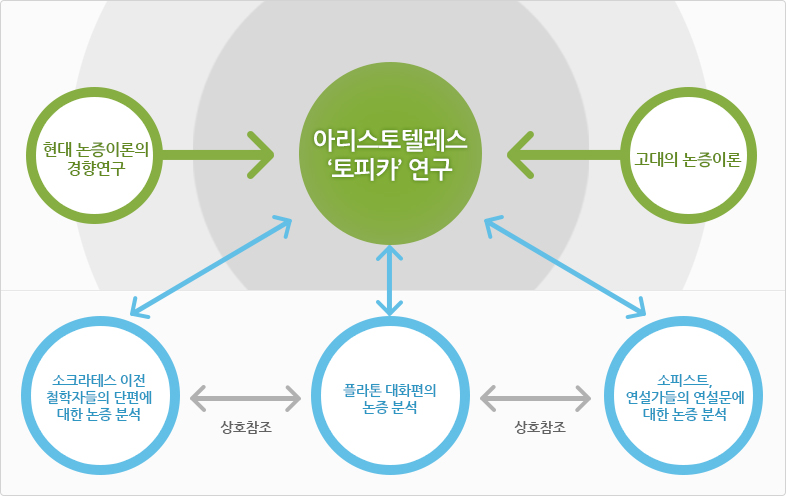Project
- University-Centered Research
- Fundamental Research
- Individual Research
 > Project > Fundamental Research Lab Program
> Project > Fundamental Research Lab ProgramArgumentations in Ancient Greece
Basic Research Support Program (Fundamental Research KRF-2009-322-A00048)
Institute of Human, Environment and Future had completed Basic Research Support Program supported by National Research Foundation of Korea (Fundamental Research KRF-2009-322-A 00048) from July 1. 2009 to June 30. 2012. This study had planned how the truth of Argumentations was in ancient Greece and what theoretical self-examination made it systematized until Aristotle through Sophist, Socrates, Plato from previous natural philosophers. In addition, it had planned to publish a primary sourcebook with translation and explanation by classifying types of demonstration type.
Subject of Research
Ancient Greek Argumentation: Primary sourcebook for philosophical foundation construction of demonstration theory
Research Period
2009. 07. 01 – 2012. 06. 30
Framework of study

Base data for disciplinary demonstration theory provided
This study sought to provide various examples or principles that would be the base of modern demonstration theory in ancient Greek demonstration reason.
That modern argumentative theory would be a perspective encompassing sophisticated and in-depth subject areas which can apply to philosophy or logics with other diverse disciplines such as rhetoric, linguistics, psychology, law, mass communication, andpedagogy. Considering the disciplinary characteristics of demonstration theory, studies about demonstration in the West ancient era can provide data on more diverse academic areas.
Reestablishment of relations between logics, apologetics, and rhetoric
Formal logics, apologetics, and rhetoric might come from one common root in the system of ancient demonstration reason, although they were located in the opposite sides in modern demonstration theory. We should seek the theoretical principles and examples in the ancient demonstration theory to reach synthetic comprehension for the meaning of demonstration and for the criteria of reasonable and valid demonstration. Thus, this study sought to reestablish the relations of rhetoric, apologetics, and logics which had been split in process of historical development of philosophy and to gauge the likelihood of integrated demonstration theory.
Data for establishment of ancient demonstration theory provided
Modern demonstration theory was developed in three different divisions as logical, dialectical, and rhetorical, which ancient Aristotle had already seemed to try.
Although several modern argumentation theories followed soul of ancient rhetoric and apologetics, they did not reach the level of in-depth discussion and studies about ancient argumentation theory considered as a model from a view of modern argumentation theory were not sufficient. Moreover, the fact that the primary data of ancient argumentation theory described by Ancient Greek or Latin were not collected and not arranged would be a serious problem. This study also suggested the significance in constructing basic data for the establishment of the ancient argumentation theory.
Practical and educational significance and follow-up study
A primary sourcebook published as a result of this study might promote to generate the secondary literatures which can be highly utilized for the general development of demonstration theory in future and for educational application. This primary sourcebook with various examples and principles from ancient Greek demonstration theory, which can be the basis of modern demonstration theory, was likely to reorganize the history of western ancient logics and to give a significant academic value for future studies including comparative studies of logics in ancient and modern and in eastern and western. It also gave importantly educational and practical value in reality of the absence of appropriately basic data for educational programs of logics, while emphasizing the significance of logic-education for critical thinking.
Project participant

Chief of research
Kim Hyekyung
Former researcher
Kim Youseok
Former researcher
Kim Jin
Former researcher
Lee Youngwhan
Former researcher
Jang Misung
Cooperation researcher
Lee Taesoo
Cooperation researcher
Kang Sangjin
Cooperation researcher
Kang Sunghoon
Cooperation researcher
Kang Choelwoong
Cooperation researcher
Lee Changwoo